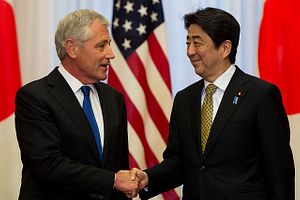The United States and Japan released an interim report on Wednesday outlining some of the progress they’ve made so far in their ongoing effort to revise their alliance’s mutual defense guidelines for the first time in nearly 20 years. The decision to revise the guidelines was made in October of last year will address how the alliance is impacted by the Shinzo Abe cabinet’s decision to reinterpret Article 9 of Japan’s constitution to allow for the country to participate in collective self-defense. The last time the two countries revised the guidelines was in 1997. The interim report released this week was originally scheduled for late September but was delayed over concerns regarding the wording of the released statement. Tokyo and Washington expected to finalize all revisions and publish the new guidelines by the end of this year.
A U.S. state department official noted that the new guidelines will “capture the greater scope of [U.S.-Japan] alliance cooperation, reflecting its more global nature.” The initiative to revisit the guidelines was announced following a two-plus-two meeting in October of last year between the defense and foreign secretaries of both the U.S. and Japan. According to U.S. officials, revisiting the defense guidelines fits in with the United States’ “pivot to Asia” strategy, which emphasizes re-balancing U.S. commitments in the region and encouraging allied states to take a greater stake in their own security. Koji Kano, a Japanese Defense Ministry official, notes that what the U.S. and Japan “need to address today is quite different from what [they] were aiming for in 1997,” according to the Associated Press. Kano added, “The point is how Japan and the U.S. can respond better in the current environment.”
Japan’s decision to reinterpret its constitutional ban on collective self-defense drew criticism from its neighbors, notably China and South Korea. Ahead of the interim report being released, a U.S. high-level delegation comprising U.S. Assistant Secretary of State Daniel Russel and Assistant Secretary of Defense for Asian and Pacific Security Affairs David Shear visited South Korea to brief Seoul on the content of the new U.S.-Japan defense guidelines.
The interim report specifically calls for the U.S. and Japan to pursue “a more expansive partnership” through “enhanced capabilities and greater shared responsibilities.” Additionally, the report notes that the revision of the guidelines will “benefit the region and beyond,” hinting at the fact that Japanese armed forces can operate more freely outside of their immediate region thanks to the new constitutional reinterpretation. However, Japanese officials made sure to emphasize the continued peaceful nature of their foreign and security policy. The report emphasizes Japan’s policy of “Proactive Contribution to Peace” — a phrase that came into use when Abe assumed power in Japan. Abe, a nationalist, wants to recast Japanese security policy in more activist terms amid a changing East Asian security environment.
In sum, the interim report updated everyone on the progress made so far in revising the guidelines that will shape bilateral defense cooperation between the U.S. and Japan for many years. According to the report, the new guidelines will likely emphasize:
- seamless, robust, flexible, and effective bilateral responses;
- the global nature of the Japan-U.S. Alliance;
- cooperation with other regional partners;
- synergy across the two governments’ national security policies; and
- a whole-of-government Alliance approach.
The current guidelines on U.S.-Japan defense cooperation are available here. The interim report is available on the Japanese Ministry of Foreign Affairs website here.

































